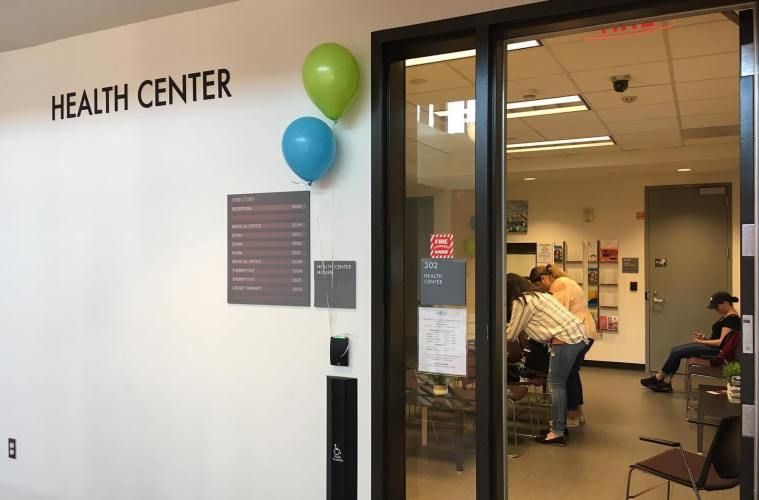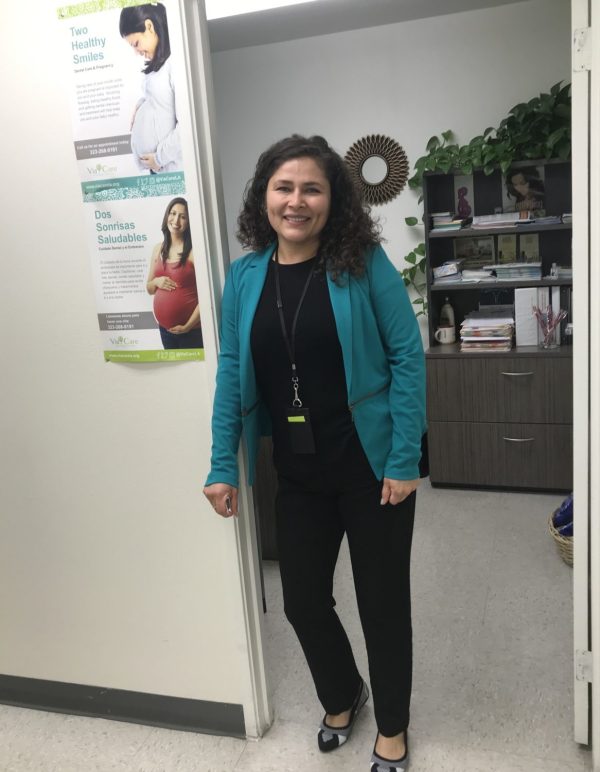
According to the Los Angeles County Department of Public Health, in late May and early June, there were an average of about 45 cases of Covid-19 per week among pregnant women. Through June and early July, there was a sharp increase in weekly cases, peaking at 157 in mid-July, which have now started to decline. Looking at cases among pregnant women by race and ethnicity, an overwhelming 80 percent are Latina/Latinx. Nobody is more acutely aware of those statistics in that at-risk community than Maria Valdez-Franco.
Valdez-Franco is the Program Director of Women’s Health at Via Care Community Health Center in East Los Angeles, which has seen about a 10 percent rate of expecting moms testing positive for Covid. The team at the clinic, which includes nutritionists and other health care providers, caters to the underserved community where she says there is still a stigma about accessing care.
“We want to be able to alleviate those fears in the East L.A. community,” Valdez-Franco tells L.A. Weekly. “If we can make moms feel safe and secure, chances are they’ll bring their babies back for proper pediatric care and kids will follow their child care and keep up with their immunization schedules. We want to make it easy for them to access care and not miss school or work for sick days.”

Noting that proper nutrition and pre-natal care have never been more significant than right now, Via Care has teamed up with program partner Vitamin Angels to help ensure low-income pregnant women receive free prenatal vitamins and counseling at a time when access to nutritious foods is at an all-time low.
The nonprofit distributes vitamins and nutrition interventions to at-risk mothers and children under five, supporting the rapidly growing uninsured and under-insured population of at-risk women and children in L.A. While the program has been in place since before the pandemic, the interventions have only become more urgent in low-income communities facing Covid health disparities and living with food insecurity in food deserts.
“The biggest impact I’ve seen with Vitamin Angels is that in the past we had patients who knew they had to take prenatal vitamins, but it took them forever to get to the pharmacy to pick them up,” Valdez-Franco says. “Some were already in their 18th week of pregnancy. The intake has to start right away. If you’re working, have to pick up your son and take care of the family, you’re exhausted by the end of the day – going to the pharmacy and picking up vitamins for yourself may not end up being a priority after finishing helping your kids with homework. We hand them out here the day they tell us they are pregnant and even before when they are considering pregnancy.”
According to Via Care’s Chief Development officer, Patrice Wagonhurst, 94 percent of the patients at Via Care have incomes under the federal poverty level.
“A lot of our patients have to make tough choices with their incomes,” Wagonhurst says. “When it comes to choices, they don’t have the money to buy prenatal vitamins even if they know they need them. And if they do go out and buy them, they’re not going to be very high quality. Our patients are getting good quality vitamins that they may not have the money to afford otherwise.”

The LADPH provided L.A. Weekly with statistics that to date, of the 1,200 pregnant women who have tested positive for the virus, 79 percent were symptomatic. In terms of when in their pregnancy women tested positive, 25 percent tested positive in the 1st trimester, 35 percent of women tested positive in the second trimester and 29 percent tested positive in the third trimester. A disturbing 11 percent, 132 women, tested positive while they were in labor and two women who were pregnant have passed away from Covid-19.
In addition to proper nutrition and prenatal care, here are some general tips for staying safe from Covid while pregnant:
- If you are pregnant or a new mom, take extra care to avoid being infected.
- Stay home as much as possible to avoid a potential for exposure.
- If you must work, ask your employer if you can work from home. If not, follow the guidance specific to your workplace for preventing an exposure in the workplace, which include wearing a face covering and keeping your physical distance (more than three steps) away from others.
- Have food delivered to your home so that you do not have to go into a grocery store.
- If you must go out, wear a cloth face covering and keep physical distance from anyone who is not from your household.
- Avoid crowds and wash or sanitize your hand often, a few times to highlight are when you are outside of and right after returning to your home and before caring your baby and eating.
- If you develop symptoms of COVID-19, it is very important that you call your doctor immediately.
- And if you are sick or positive for COVID-19 and breastfeeding, wash your hands before touching the baby or any pump or bottle you are using.
- Wear a mask while breastfeeding or bottle feeding, and, if possible, ask someone else to feed the baby your breastmilk by bottle.
Here is further detailed guidance for expectant and new moms: http://publichealth.lacounty.gov/media/Coronavirus/docs/people/GuidancePregnancy.pdf
To view the original article, visit: https://www.laweekly.com/pregnant-during-the-pandemic-finding-care-with-vitamin-angels/

